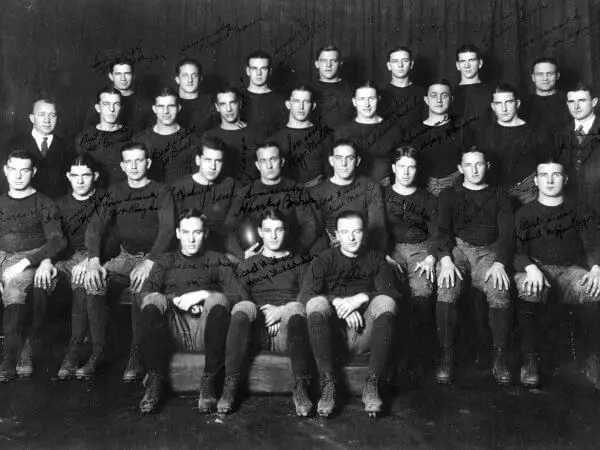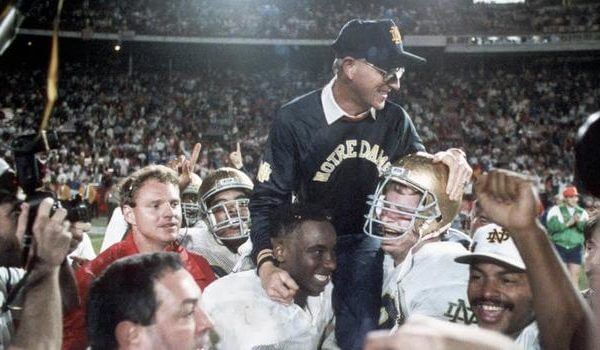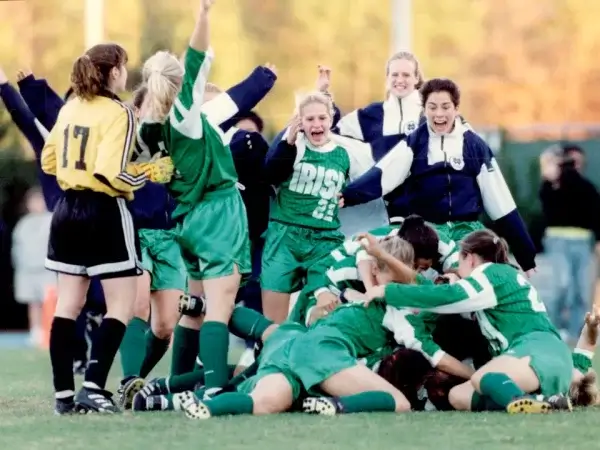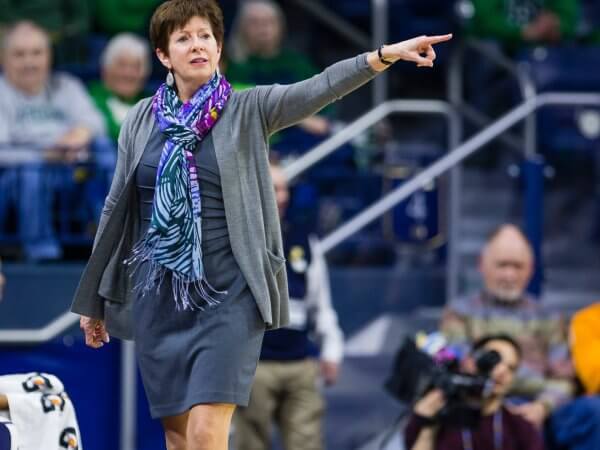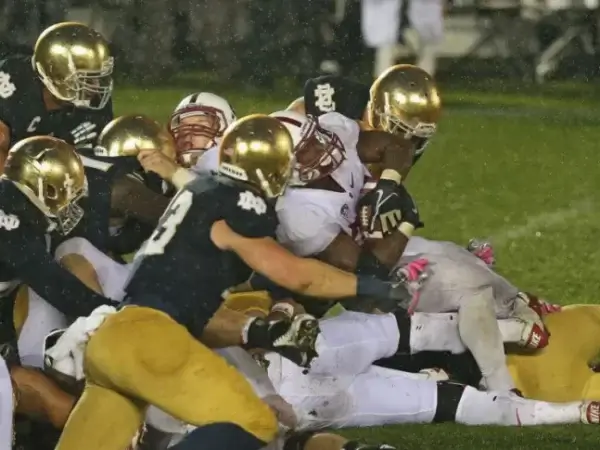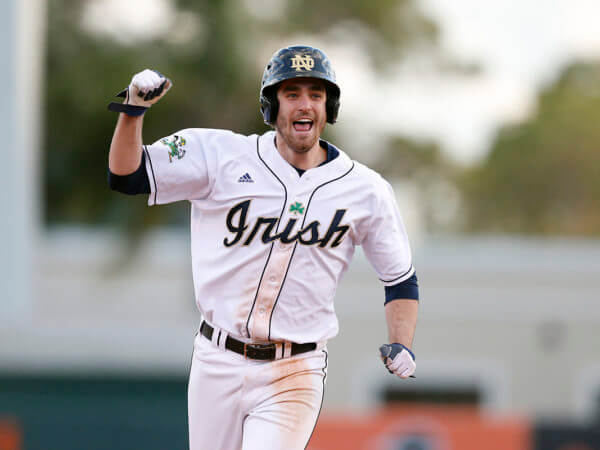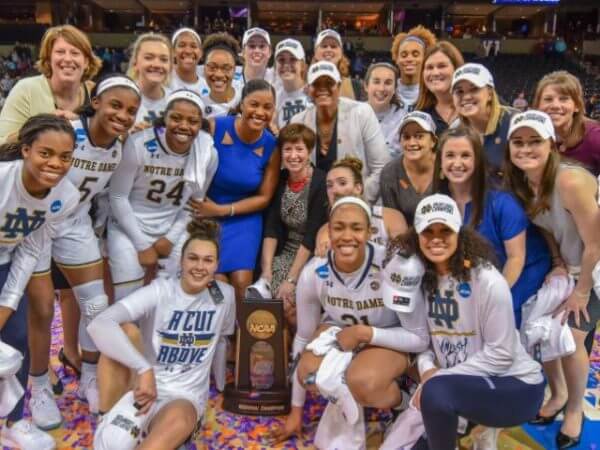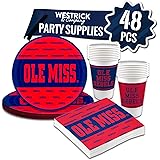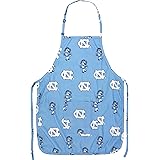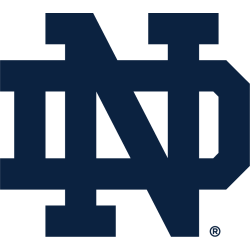
College Sports Established
1894
Location
Notre Dame, Indiana
College Name
University of Notre Dame
Collegiate History
1973 - Present / NCAA Division 1
1919 - 1973 / University Division of the NCAA
Conference History
2013 – Present / ACC Conference
1995 - 2013 / Big East Conference
1978 - 1995 / Division I Independent
1894 - 1978 / Unknown
Nickname
Fighting Irish - The Notre Dame Fighting Irish are one of the country's most iconic college sports teams. Since their inception in 1887, they have been known for their fierce competitiveness and passionate fanbase. But did you know that their nickname has a fascinating history? Here’s how the Notre Dame Fighting Irish got its name.
It all started with an early football game between Notre Dame and Northwestern University in 1889. At halftime, Coach Charles Eames asked his team, “What’s the matter with you guys? You’re all playing like wild Indians! Let's show them what actual fighting Irish can do! And so it began…
The term "Fighting Irish" was quickly adopted by fans and players alike to describe this new era of hard-nosed play on both sides of the ball from then on out. It wasn't until 1909, when Father John O'Hara wrote an article about ND football entitled “The Rise Of The Fighting Irish," however, that it became official; he referred to them not only as "fighting" but also noted that they were incredibly proud of being called 'Irish.' From there, other schools began using similar nicknames, such as Nebraska Cornhuskers or Texas Longhorns - though none entirely captured national attention like those found at South Bend, Indiana's beloved university: The University Of Notre Dame - Home To Those Legendary Golden Domers…the FIGHTING IRISH!!!
Today, Notre Dame is still proudly represented by its unique mascot Leprechaun who stands guard over Touchdown Jesus while donning traditional green attire. While some may debate whether or not this nickname accurately reflects any particular group within Ireland – one thing is certain: no other school enjoys such high levels of respect & admiration for having stuck with tradition since day 1: Go IRISH!!
NCAA Championships
Baseball 2
1994, 1951
Men's Basketball 0
Women's Basketball 2
2018, 2001
Football 13
1988, 1977, 1973, 1966, 1964, 1949, 1947, 1946, 1943, 1930, 1929, 1924, 1919
Soccer 1
2013
- 1924
- 1988
- 1995
- 2010
- 2012
- 2013
- 2018
-
The football team wins its first national championship
In 1924: The football team wins its first national championship under coach Knute Rockne and features the legendary Four Horsemen backfield. -
Holtz and NCAA Championship 1988
In contrast to Faust, Holtz was well known as a master motivator and a strict disciplinarian. The tone was set with Holtz’s first meeting with his team as Irish head coach in 1986, immediately demanding his players sit up straight in their chairs and look him in the eye as he spoke. He displayed the latter trait in spades when ... -
women’s soccer team wins its first national championship
In 1995: The women’s soccer team wins its first national championship under coach Chris Petrucelli and features forward Cindy Daws. -
women’s basketball team reaches the NCAA under coach Muffet McGraw
In 2010: The women’s basketball team reaches the NCAA championship game for the first time under coach Muffet McGraw and features guard Skylar Diggins. -
football team finishes the regular season undefeated and ranked No. 1
In 2012: The football team finishes the regular season undefeated and ranked No. 1 for the first time since 1988, but loses to Alabama in the BCS title game. -
ND Baseball Wins Champs 2013
The 2013 Notre Dame Fighting Irish men’s soccer team represented the University of Notre Dame during the 2013 NCAA Division I men’s soccer season. It was the 37th season of the university fielding a program. The Irish were coached by 13th-year head coach Bobby Clark and sixth-year assistant coach, B. J. Craig, who was promoted to associate head coach prior ... -
Women’s Basketball Champs for ND
After an injury-plagued start to the 2017–18 season, which saw four Irish players lost to injury, Notre Dame won its second National Championship by beating Mississippi State 61–58. Junior guard Arike Ogunbowale scored the game-winning three-point shot with 1/10th of a second left, two days after scoring a similar buzzer-beater to knock out Connecticut in the semifinal game. The win ...
To qualify as the greatest player for this team, the player must have played one season for this team. If not, we will remove the player.
* verifies that player has played for this team as an added player by a fan.
History of the Fighting Irish
Notre Dame's success is mainly due to its commitment to excellence on and off the field. The team has had some legendary coaches, such as Knute Rockne, Frank Leahy, Ara Parseghian, Lou Holtz, and more recently, Brian Kelly, who all helped lead them towards greatness on Saturday afternoons during football season or any other sport throughout each year’s schedule. In addition to these great leaders that guided Notre Dame through many successes over time, there were also countless talented players, from Joe Montana at quarterback all way up until today, where we see stars like Manti Te'o leading this historic franchise into new heights every week with his outstanding playmaking ability on defense.
Not only does Notre Dame possess quality leadership, but it also has an incredibly passionate fan base that supports it no matter what happens out on the field; whether it’s cheering loudly during home games or traveling across the country for away matchups, fans always show up ready for action when supporting their beloved Fighting Irish! This loyalty, combined with consistent winning, makes this school truly special compared to many others around college football nationwide, which is why so many people continue tuning in to watch every Saturday afternoon regardless if they're wearing green or not!

